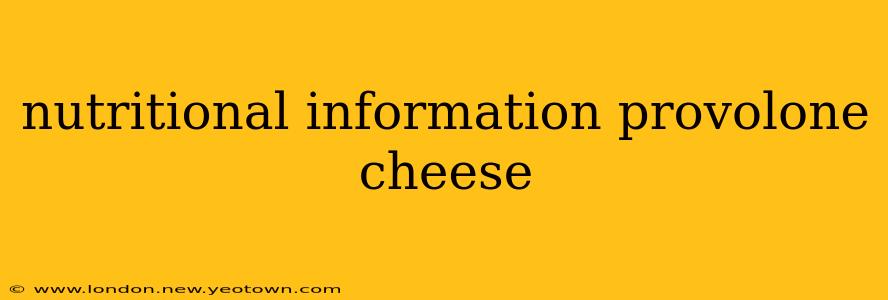Provolone. The name itself conjures images of melty goodness draped over sandwiches, grated atop pasta, or simply enjoyed on its own. But beyond its delightful taste and versatile nature lies a nutritional profile worth exploring. This isn't just your average cheese; provolone offers a unique blend of nutrients that contribute to a balanced diet. Let's embark on a journey to uncover its nutritional secrets.
What are the nutritional facts of provolone cheese?
This is a question often asked, and the answer isn't a single number. The nutritional content of provolone cheese varies depending on several factors: the type of milk used (cow's milk is most common, but others exist), the aging process (longer aging generally means a sharper flavor and slightly different nutritional values), and the fat content (ranging from low-fat to whole milk variations).
However, we can provide a general overview based on a typical serving size of 1 ounce (approximately 28 grams) of part-skim provolone cheese:
- Calories: Around 80-100 calories.
- Fat: 7-8 grams, with a varying proportion of saturated and unsaturated fats.
- Protein: Approximately 7-8 grams—a good source of protein for muscle building and repair.
- Calcium: A significant source of calcium, vital for strong bones and teeth. One ounce often provides around 200-250 mg.
- Sodium: Provolone, like most cheeses, is relatively high in sodium. Be mindful of your daily intake if you're watching your sodium levels. The amount varies but is typically between 170-200mg per ounce.
How many calories are in provolone cheese?
As mentioned above, the calorie count fluctuates based on the type of provolone. A one-ounce serving of part-skim provolone usually contains between 80 and 100 calories. Whole milk varieties will naturally have a higher calorie count. Remember, portion control is key to managing calorie intake.
Is provolone cheese good for you?
Provolone cheese offers several potential health benefits. Its high protein content supports muscle growth and repair, making it a valuable addition to a balanced diet. The calcium content is beneficial for bone health, particularly important for growing children and adults maintaining bone density. Additionally, provolone contains various vitamins and minerals, contributing to overall well-being. However, its high sodium content necessitates moderation, especially for individuals with high blood pressure concerns.
What are the health benefits of eating provolone cheese?
The health benefits of provolone cheese stem primarily from its protein and calcium content. Protein is essential for building and repairing tissues, supporting a healthy immune system, and contributing to satiety (feeling full). Calcium is fundamental for bone health, preventing osteoporosis and other bone-related issues. Provolone also contains other beneficial nutrients, though in smaller quantities compared to its protein and calcium.
Is provolone cheese high in cholesterol?
Like many cheeses, provolone does contain cholesterol. The exact amount depends on the type and fat content. Individuals concerned about their cholesterol levels should be mindful of their overall dairy intake and consult with a healthcare professional or registered dietitian for personalized dietary advice.
Is provolone cheese high in sodium?
Yes, provolone cheese is relatively high in sodium. This is a common characteristic of many cheeses due to the salting process involved in their production. Individuals sensitive to sodium or managing high blood pressure should consume provolone cheese in moderation.
Conclusion: A Delicious Part of a Balanced Diet
Provolone cheese, with its rich flavor and versatility, can certainly be a part of a healthy diet. By understanding its nutritional profile and consuming it mindfully, you can enjoy this delicious cheese while also prioritizing your well-being. Remember to consider the type of provolone, your individual dietary needs, and practice portion control for optimal health benefits. Consult with a healthcare professional or registered dietitian for personalized dietary guidance.

